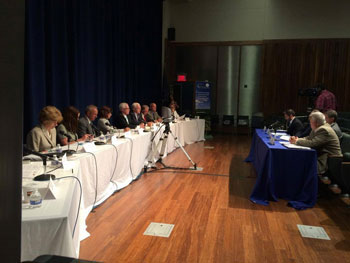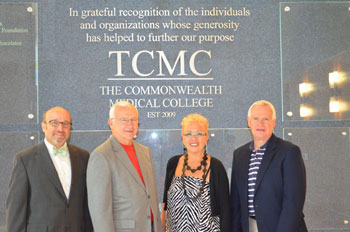|
Tuesday,
August 4,
2015
Dear Friends,
Hello! Thank you for
subscribing to my E-newsletter. I am honored to serve the 23rd Senate District
and look forward to working with you toward building a better future for
Pennsylvania!
This E-newsletter serves
to keep you updated on what is happening throughout Bradford, Lycoming,
Sullivan, Susquehanna and Union counties and what I am doing as your state
senator in Harrisburg. I hope that you will find this E-newsletter helpful, and
if you have any questions or concerns, please feel free to contact me.
Gene Yaw
State Senator
www.SenatorGeneYaw.com
Op-Ed: Gov. Wolf – Politics Before People
By Sen. Gene Yaw (R-23)
Like many of my colleagues in the Pennsylvania Senate, I was deeply disappointed that Governor Wolf chose to veto a $30.18 billion, no-tax, balanced state
budget plan that would have made new investments in education, improved the funding mechanism for our schools and provided funding for critical state
services. The Governor’s impractical veto of the entire spending plan leaves us no closer to an agreement now than when he first introduced his budget
proposal in March, which is a true disservice to the people who elected him on the promise of a “fresh start.” The real question here: What is the
Governor’s motive?
The only thing to be gained by threatening an
interruption of government services is political leverage. To
put the well-being of millions of state residents at risk for
the sole purpose of getting his own way is unbelievably arrogant
and thoughtless. In pursuing this scorched-earth policy, the
Governor has jeopardized funding for numerous programs and
services relied upon by millions of state residents. He has done
so not for the sake of good public policy, but rather for the
worst of reasons – politics and a perceived political advantage.
We can argue that all sides bear some share of
responsibility for failing to reach a mutually agreeable budget
plan. The blame, however, for any delay in state funding for
critical government services lies entirely on the Governor.
Governor Wolf had an opportunity to move the process forward by
approving the entire budget, or even just the numerous line
items on which he and the legislature agree. It is extremely
unfortunate that he chose the nuclear option of placing a higher
value on politics than people. Ironically, out of the 400 budget
line items approved by the legislature, almost 70 percent are
funded at the level the Governor requested or higher. A 70
percent win in politics is a “landslide.”
According to the Governor, the main sticking
point in the budget is education. There is near-universal
agreement that we can find a better way to allocate funding to
our schools, and I appreciate that the Governor has at least
acknowledged the problem. But, his solution to the problems
facing the education community are extremely problematic. We
cannot simply raise broad-based taxes to funnel more resources
and tax relief into only those districts that supported Governor
Wolf in the last election.
Pouring more money like syrup over education
solves nothing and just encourages irresponsible spending. That
approach only invites all state residents to pay a higher tax
burden while only a select few reap the benefits. Pennsylvania
already spends significantly more than the national average on a
per-student basis. Without addressing the cost-drivers in the
budget, like pension reform, property taxes will continue to
increase. The Governor’s position on pension reform leads to the
result that unborn children who might become teachers have a
right to rely on the pension plan currently in existence.
It is truly unfortunate that a primary reason
for the budget veto is the Governor’s desire to put a severance
tax trophy on his wall. Of course, to achieve this goal, the
Governor hides behind kids and alleges that they are being
deprived of an education due to a lack of funding. Not only is
this misleading but using kids in this manner is repugnant. The
facts are that Pennsylvania spends about $3,000 more per student
than the national average. Many have argued that a new funding
formula, not more money, is needed. To this end, the Basic
Education Funding Commission was commissioned by the legislature
over a year ago to develop a new funding formula. Governor Wolf
supported the activities of this committee, which, in fact did,
propose a new funding formula. That proposal for distributing
state funding for basic education to Pennsylvania’s 500 school
districts was adopted by the legislature and is a part of the
approved budget. The Governor vetoed the very thing he asked
for. Why?
Recognizing that education spending is a
priority for Pennsylvanians, the budget approved by the
legislature and vetoed by the Governor increased Basic Education
funding by $100 million, increased Special Education funding by
$20 million, increased Pre-K Counts funding by $25 million and
increased support for Head Start programs by $5 million. In
fact, every school district across my Senate District and the
state would have received more basic and special education
funding than they received last year. The approved budget also
authorized $50 million more for higher education and $348
million more for Pennsylvania school employee retirement. The
education appropriation passed by the legislature for the FY
2015-16 was the largest ever for Pennsylvania.
In addition, Governor Wolf’s veto of the budget
package also eliminated the General Assembly’s initiative to
provide local school districts with reimbursements through the
PlanCon Program and put in place a revised process for future
reimbursements. The state’s Planning and Construction Workbook,
otherwise known as PlanCon, is a 41-year old state program to
assist local school districts in meeting the construction costs
of building new facilities or renovating older ones. According
to estimates, the Commonwealth currently owes local school
districts reimbursement in excess of $5.3 billion for over 540
projects. The provisions included in the vetoed budget package
would have allowed the Commonwealth to pay the school districts
the outstanding state reimbursement in immediate lump sum
payments. Now, many districts are faced with years of
uncertainty and the need to use local funds to continue to pay
the state’s share of debt service and construction costs while
waiting for reimbursement.
The Governor’s plan is not a viable alternative,
and this opinion is validated by the fact that many of his
Democrat allies in the legislature have not publicly endorsed
his plan. A recent report issued by the National Association of
State Budget Officers (NASBO) indicated that of the more than $3
billion in net tax increases planned by all 50 states, Governor
Wolf’s proposal is the largest of the recommended revenue hikes.
Moreover, the Governor’s planned hike is larger than the
combined hike for all 50 states due to some states proposing tax
cuts. The NASBO report also shows that the Governor’s planned
spending increases, including his property tax and pension
proposals, put Pennsylvania in the top three for spending out of
all 50 states. Under his plan, spending would increase by $4.77
billion, right behind New York ($7.49 billion) and California
($5.31 billion). According to a recent PennLive article,
Governor Wolf is the most liberal Governor in the entire United
States. That is not Pennsylvania’s heritage.
The Governor’s budget veto puts the onus on his
Administration to chart a better path forward. Continuing to
insist on his ill-conceived, indefensible tax-and-spend budget
that has been thoroughly vetted and soundly rejected by the
legislature and the people of Pennsylvania will only hurt the
people he was elected to help. Governor Wolf needs to work with
the legislature to adopt a budget that is based on sound fiscal
policy, rather than political posturing. Do something positive
Governor!
|
|
Center for
Rural PA Update |
 |
Center for Rural Pennsylvania Hearing on Heroin and Opioid
Addiction
On Wednesday, July 29,
Center board members welcomed presenters and attendees to the second of
three public hearings on heroin and opioid addiction treatment and
recovery at The Commonwealth Medical College in Scranton. Public and
private treatment and recovery specialists, health care professionals,
educators, and law enforcement officials presented testimony at the
hearing.
For more information,
click here.
|

|
Pictured left to right:
Dr. Steven Scheinman, president and dean, The Commonwealth Medical
College; Sen. Gene Yaw; Ida Castro, JD, vice president, Government and
Community Relations, The Commonwealth Medical College; and Barry Denk,
Center for Rural PA director.
|
|
Winter Jobs
Deadline Approaching |
Application Deadline for PA Winter Jobs Program is Aug. 21.
If you’re interested in working within the Pennsylvania Department of
Transportation (PennDOT) Winter Maintenance Program, please click
here.
The program runs Sept. 1 through March 31. Positions include Transportation
Equipment Operators, Diesel Mechanics, Radio Dispatchers, Clerk Typists,
Welders, and Tradesman Helpers. People in these positions supplement the
permanent workforce and have the potential to lead to permanent full-time
employment.
Positions pay between $12.25 and $18.66 hourly. The application deadline is Aug.
21. All interested candidates should apply through
www.employment.pa.gov
under the PennDOT Winter Maintenance Program category. Applicable skills and
requirements, such as CDL qualifications, will be tested for during the
interview process.
 With
Pennsylvania leading the nation in reported cases of Lyme disease, the
Pennsylvania Department of Health has called for increased awareness about
this serious disease. With
Pennsylvania leading the nation in reported cases of Lyme disease, the
Pennsylvania Department of Health has called for increased awareness about
this serious disease.
When detected early, Lyme disease can be treated with antibiotics. Left
untreated, the disease can spread to the joints, heart and nervous system.
Early diagnosis is important in preventing late-stage complications. The
first line of defense against Lyme disease is to take precautions in the
outdoors by using insect repellent with DEET, wearing long sleeve shirts and
long pants, checking for - and promptly and properly removing – any ticks,
and showering shortly after exposure.
The recently released 2014 Lyme statistics show increases in reported Lyme
cases in most counties in the state. For the past five years, Pennsylvania
has led the nation in reported Lyme disease cases.
For more information on Lyme disease and to view the latest case report, click
here.
Lycoming County Planner Appointed to State Transportation Advisory
Committee
Last week, Lycoming County Transportation Planner, Mark Murawski, was
appointed by PA Senate President Pro Tempore Joe Scarnati, 25th District, to
serve on the Pennsylvania Transportation Advisory Committee (TAC). I was
pleased to recommend Mark to fill this vacancy.
The 30-member committee consults with and advises the State Transportation
Commission and PennDOT Secretary to determine goals and allocations of
resources to address all modes of transportation. Over the past decade, the
TAC issued a dozen reports on a variety of transportation topics including
installing cameras in work zones to improve motorist and highway worker
safety, determining overall transportation funding needs that led to the
passage of Act 89 legislation, and defining a core transportation system to
ensure strategic targeting of investments important to goods movement and
economic development.
Mark will join another Lycoming County resident and former Woodward Township
Supervisor, Jeff Stroehmann, who is already serving on the Transportation
Advisory Committee. Stroehmann is Vice-President of Operations at Moran
Industries.
DEP Accepting Applications for Small Business Advantage Grants
Small businesses can apply now for PA Advantage Grants to help pay for
pollution-cutting, energy-efficient upgrades. The grants provide funding to
projects that include anti-idling technology for trucks, HVAC and boiler
upgrades, high-efficiency lighting, solvent recovery systems and waste
recycling systems. Grants are funded by the Impact Fee paid by natural gas developers and the state Capital Stock and Franchise Tax.
For more information,
click here.
PHEAA Update!
 The PA Higher Education Assistance Agency reminds first-time applicants that if you plan to enroll in a community college; a designated Pennsylvania
Open-Admission institution; a business, trade, or technical school; a hospital school of nursing; or a two-year program that is not transferable to another
institution; you must submit the FAFSA and the Pennsylvania State Grant Form by August 1.
For more information, click here. The PA Higher Education Assistance Agency reminds first-time applicants that if you plan to enroll in a community college; a designated Pennsylvania
Open-Admission institution; a business, trade, or technical school; a hospital school of nursing; or a two-year program that is not transferable to another
institution; you must submit the FAFSA and the Pennsylvania State Grant Form by August 1.
For more information, click here.
If you do not wish to receive this email, click
here
to unsubscribe.
Privacy Policy
2015 © Senate of Pennsylvania
senatorgeneyaw.com
|



 With
Pennsylvania leading the nation in reported cases of Lyme disease, the
Pennsylvania Department of Health has called for increased awareness about
this serious disease.
With
Pennsylvania leading the nation in reported cases of Lyme disease, the
Pennsylvania Department of Health has called for increased awareness about
this serious disease.